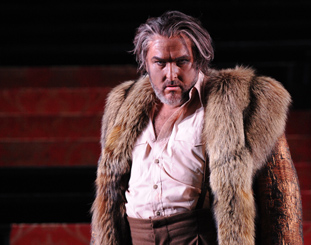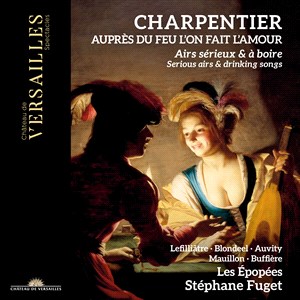Review: The Chimney Sweep/ Pinchgut Opera
The Chimney Sweep (Der Rauchfangkehrer)
Musikalisches Lustspiel in three acts by Antonio Salieri, libretto by Joseph Leopold Auenbrugger. Performed in the vernacular.
City Recital Hall, Monday July 7th 2014.
Pinchgut Opera.

Photo : Keith Saunders, courtesy Pinchgut Opera.
At a time when opera companies are wringing their hands over budgets and trimming expenses back to the core, Sydney’s Pinchgut Opera has made a courageous venture in presenting for the first time, a mid-year offering in addition to its traditional sparkler at the end of the year.
And that’s not all. The annual December event which has become something of a fixture on the calendar since Pinchgut’s first offering in 2002, has focused on early opera, apart from two operas by Mozart (Idomeneo) and Haydn (L’anima del filosofo). This winter presentation of Antonio Salieri’s The Chimney Sweep is a foray into the realm of singspiel, or Musikalisches Lustspiel (although it has been said that the work is more akin to the Italian opera buffa).
The opera’s alternative English title is The Indispensable Betrayers of Their Lordships’ Self-interest. A product of the Age of Enlightenment, it is the exact anti-thesis to Pinchgut’s staple fare of serious early opera.
The Chimney Sweep has all the ingredients of the comedies of the late 18th century – the lives of the bourgeoisie and money – money for marriage, money as inheritance or – just not enough of it. It premiered in 1781 at the Vienna Burgtheater, built under the auspices of Joseph II. It was his intention that it be a venue for both the aristocracy and the populace to attend entertainment that was accessible to all. The opera represented foil to the established operas and operettas. Class conflict is at the core of the tale.

Photo: Keith Saunders, courtesy Pinchgut Opera.
Performed in English with lyrics by Andrew Johnston and the dialogue translated by director Mark Gaal, sopranos Amelia Farrugia as Mrs Hawk and Janet Todd as Miss Hawk stole the show, deftly moving from speech to the stratospheric leaps demanded by Salieri’s punishing vocal writing. Their voices were well matched; their comic timing and flawless technique assured gratifying and entertaining characterisations.
Stuart Haycock in the title role as Volpino, Alexandra Oomens as Lisel, Christopher Saunders as Mr Wolf, David Wolosko as Mr Bear and David Hidden as Master Tomaso created a compact ensemble with impeccable performances underpinned by artful casting, sumptuous costumes and meticulous attention to accessories and props.

Music director Erin Helyard ‘s jazzy, hi-octane direction of the Orchestra of the Antipodes, from the harpsichord (with a roguish reference to Mozart’s Eine Kleine Nachtmusik) nailed the ensemble, propelling the narrative ever forward.
Pinchgut’s innovative staging of opera in what is effectively a recital hall has never failed to delight. For The Chimney Sweep, the stage was dominated by a chimney the surround of which was reminiscent of La Bocca della Verità (The Mouth of Truth), a Roman landmark which achieved popular fame in the Gregory Peck/Audrey Hepburn movie Roman Holiday. Its connection with this production being the myth that it would bite off the hands of liars. Given the duplicity of the characters in the tale, La Bocca was an apt backdrop to the drama and its appetite sated.
At the end of the first act, La Bocca was transformed into a woodland scene with mock solemnity, for the opera within the opera of the allegorical Abduction of Ganymede, the players acting out the buffoonery for which Salieri was renowned.
Saving one of the best features for the end, dozens of endearing albeit grubby chimney sweeps from the Sydney Children’s Choir joined in the finale swelling the sound of the ensemble with a freshness and energy that underscored the universality and mirth of the story’s moral:
“Long life to all women, all men, and all creatures!
Take chances, live boldly and true to your natures.
Spend all of your days in exciting adventures!……
…….Embrace this queer world and all its paradoxes,
For soon we will all of us end up in boxes.”
Salieri composed The Chimney Sweep at the command of Joseph II. It was performed 13 times in Vienna during 1781–2. Hot on its heels came the premiere of Mozart’s The Abduction from the Seraglio (Die Entführung aus dem Serail) K. 384 written for the same opera company and which is said to have eclipsed Salieri’s work.
How ironic that Mozart’s librettist Da Ponte, wrote more operas for Salieri than for Mozart. La cifra (1789) was a precursor of Così fan tutte, a libretto intended for Salieri but one that he discarded. Likewise, in 1791 Salieri declined the libretto which became Mozart’s La clemenza di Tito.
The success of this production by Pinchgut Opera which stared down two breaks with their traditions represents a coming of age for the company and is a testament to its maturity and the calibre of its presentations.
Shamistha de Soysa for SoundsLikeSydney©
SoundsLikeSydney accepts no fee for reviews.







